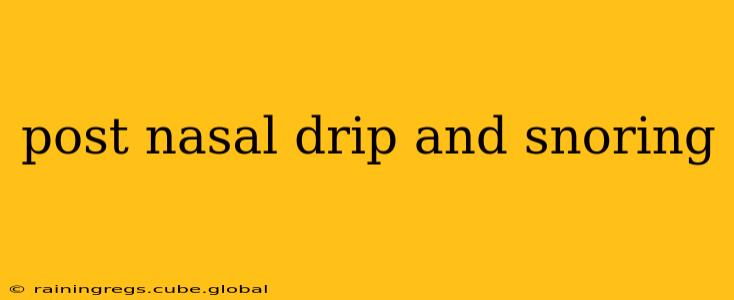Post nasal drip and snoring are often unwelcome bedfellows, creating a frustrating cycle of discomfort and sleep disruption. While they might seem unrelated at first glance, the connection between post nasal drip and snoring is significant and understanding this relationship is key to finding effective relief. This comprehensive guide will explore the link between these two common conditions, delve into their causes, and outline potential solutions.
What is Post Nasal Drip?
Post nasal drip (PND) is the excess drainage of mucus from the back of your nose and throat. This mucus can be thin and watery or thick and sticky, depending on the cause. Unlike a runny nose, where mucus flows out of your nostrils, with PND, the mucus drips down the back of your throat, often causing a tickle, cough, or sore throat. It's a common symptom of various upper respiratory conditions, and can occur at any age.
What is Snoring?
Snoring is the rough or rattling sound made during sleep caused by vibrations in the soft tissues of the upper airway. When you sleep, the muscles in your throat relax. If this relaxation is excessive, it narrows the airway, causing the air to vibrate as you breathe in and out, producing the snoring sound. While occasional snoring is normal, habitual, loud snoring can be a sign of underlying health issues.
How are Post Nasal Drip and Snoring Connected?
The connection between post nasal drip and snoring lies primarily in the airway obstruction. Excess mucus from post nasal drip can further clog the already narrowed airways, exacerbating snoring. The thick mucus acts as a physical barrier, making it harder for air to pass through, leading to louder and more frequent snoring. Additionally, the irritation caused by the post nasal drip can trigger a cough reflex, which can disrupt sleep and contribute to the snoring problem.
Why Does Post Nasal Drip Cause Snoring?
The increased mucus production associated with post nasal drip leads directly to airway obstruction. This obstruction is the primary reason why PND often worsens snoring. The mucus can coat the throat and back of the nose, increasing the resistance to airflow and amplifying the vibrations that cause snoring. Think of it like trying to breathe through a straw partially filled with a sticky substance – it becomes significantly more difficult.
What are the common causes of post nasal drip leading to snoring?
Several factors contribute to post nasal drip, and each can potentially worsen snoring. These include:
- Allergies: Allergens like pollen, dust mites, and pet dander trigger inflammation and increased mucus production.
- Infections: Viral or bacterial infections of the upper respiratory tract can lead to increased mucus and post nasal drip.
- Irritants: Exposure to environmental irritants such as smoke, dust, or strong chemicals can irritate the nasal passages.
- Non-allergic rhinitis: This condition involves nasal inflammation not triggered by allergens.
- Gastroesophageal reflux disease (GERD): Stomach acid refluxing into the esophagus can irritate the throat and trigger post nasal drip.
- Sinusitis: Inflammation of the sinuses can lead to increased mucus production and drainage.
Can Post Nasal Drip Cause Sleep Apnea?
While post nasal drip doesn't directly cause sleep apnea, it can certainly worsen its symptoms. Sleep apnea is characterized by pauses in breathing during sleep. The added obstruction from excess mucus can further restrict airflow, increasing the severity and frequency of these breathing pauses, leading to more fragmented and less restful sleep.
How to Treat Post Nasal Drip and Snoring?
Treatment for post nasal drip and snoring often involves addressing the underlying cause. This may include:
- Allergy management: Avoiding allergens, using antihistamines, or undergoing allergy testing and immunotherapy.
- Infection treatment: Antibiotics for bacterial infections and rest for viral infections.
- Medication: Decongestants, nasal corticosteroids, or antihistamines to reduce inflammation and mucus production.
- Lifestyle changes: Maintaining good hydration, using a humidifier, and avoiding irritants.
- Saline nasal rinse: This can help to clear nasal passages and thin mucus.
- Surgery: In severe cases, surgery may be considered to correct structural abnormalities contributing to airway obstruction.
It is crucial to consult a doctor or ENT specialist to determine the specific cause of your post nasal drip and snoring and to develop a personalized treatment plan. Self-treating may not address the root cause and could potentially worsen the condition.
When Should I See a Doctor?
Consult a healthcare professional if:
- Your snoring is excessively loud or disruptive to your sleep.
- You experience daytime sleepiness, fatigue, or difficulty concentrating.
- You have episodes of gasping or choking during sleep.
- Your post nasal drip is persistent or accompanied by other symptoms like fever, severe headache, or facial pain.
By understanding the complex relationship between post nasal drip and snoring, you can take proactive steps towards improving your sleep quality and overall health. Remember, consulting a healthcare professional is essential for accurate diagnosis and effective treatment.
